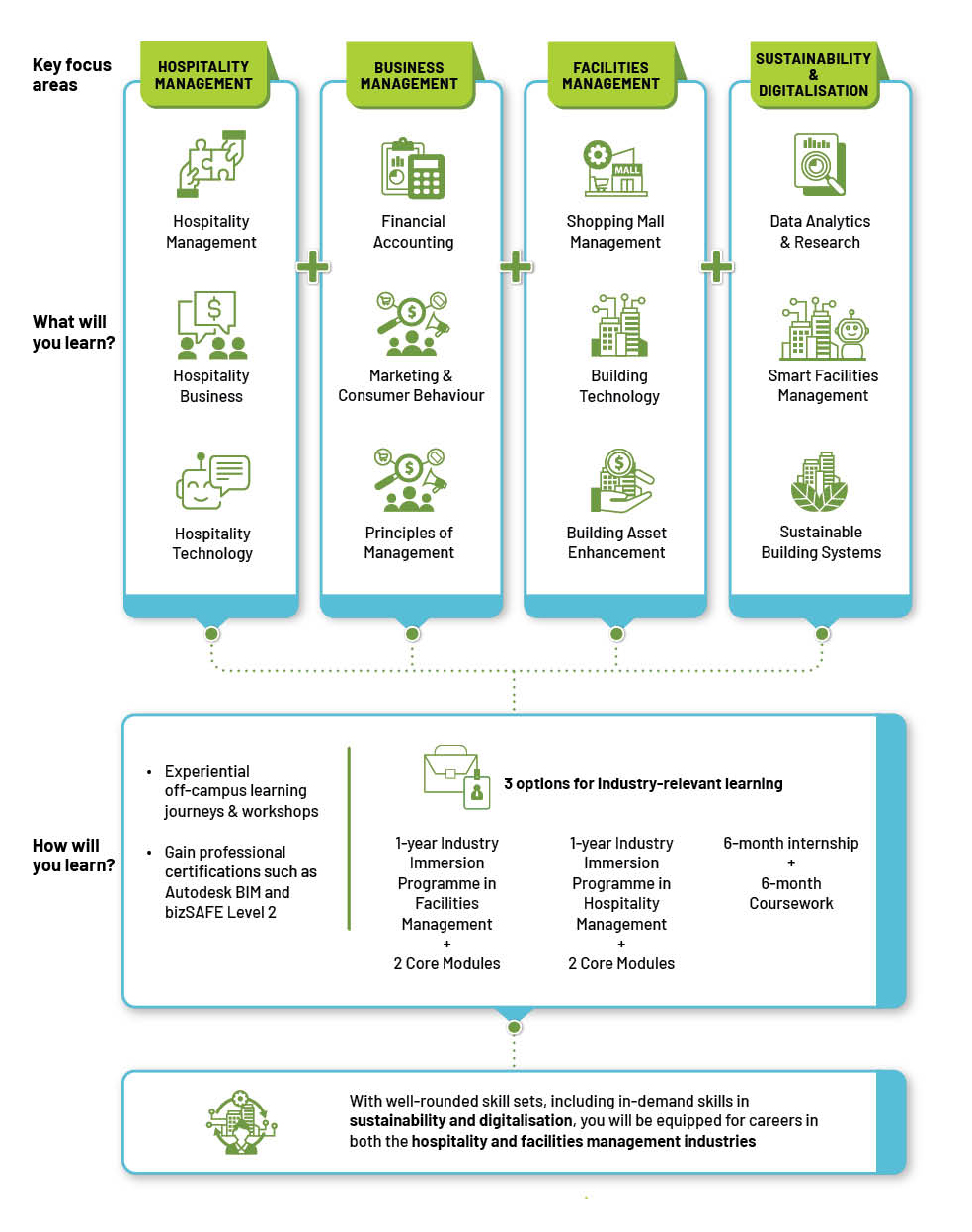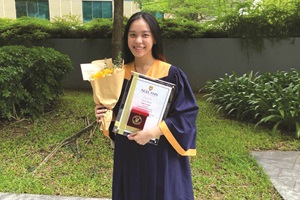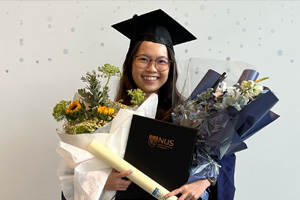Why HLFM?
- The only hybrid polytechnic diploma that prepares you for both hotel and leisure operations as well as facilities management
- Strong focus on digitalisation skills, green technologies and innovative real-world learning experiences with leading industry partners
- Customise your learning with a choice of a six-month internship or one-year Industry Immersion Programme
- Jumpstart your degree with the NP-NUS Pathway and earn credits towards your NUS degree while still in poly
About HLFM
The only hybrid diploma that covers both hotel
operations and facilities management, the Diploma
in Hotel & Leisure Facilities Management (HLFM)
opens multiple doors for you! With smart technology
transforming the hotel and leisure industries, and the
focus on environmental sustainability driving green
innovation, HLFM’s dual focus on smart and green
technologies will give you an edge in these exciting
sectors!
HLFM will equip you with digitalisation skills such
as data analytics and data visualisation to address
real-world challenges. Get an added edge by learning
smart technologies including Building Information
Modelling (BIM), microbit coding and Internet of Things
(IoT). You will also be trained to manage facilities such
as shopping malls and integrated resorts.
Look forward to learning journeys, off-campus
workshops, and the opportunity to choose between
a six-month internship or a one-year industry
immersion programme with local or overseas hotels!
These experiences will develop your skills in areas
such as front and back office management, digital
marketing, as well as sustainable and business
continuity practices. Our established collaborations
with reputable hotels, real estate development and
management firms, and technology companies
ensure you gain industry-current skills, making you
career-ready.
Want to get hands-on experience working with
real-life data? Our on-campus smart Integrated
Operations Centre will become your classroom
where you learn how to solve real-world challenges
through authentic experiences and put your facilities
management skills to the test.
Get fully prepared for the workforce with relevant certifications such as Autodesk BIM, Fire Safety Manager*, Niagara 4 Technical Certification, Agent blazer Champion by Salesforce and bizSAFE Level 2. These internationally-recognised qualifications will give you an edge when you join the industry.
*Subject to fulfilment of all requirements
Looking to get a taste of university life while still
in poly? Jumpstart your journey towards NUS’
Infrastructure Project Management (IPM) degree
with the NP-NUS Pathway^, which lets you continue
seamlessly into the IPM programme at NUS — allowing
you to fast-track your studies and graduate sooner
^For selected students only
Highlights of Skills & Competencies

Unique Learning Experiences
Data hackathon with Honeywell Tridium
Analysing past data enables targeted energy optimization by identifying patterns, inefficiencies, and automation opportunities. HLFM Year 2 students receiving guidance from Building Management System (BMS) experts and lecturers, learned N4 programming, utilized industry tools, and developed innovative solutions to make buildings smarter. Collaborations with the Tridium Niagara Framework provided valuable insights into data-driven energy efficiency and sustainable building management through hands-on learning and brainstorming. Interactions with industry partners in China further enriched their understanding of current practices and emerging trends, strengthening their knowledge of sustainable, data-driven building management.
Further Studies
With a well-recognised diploma under your belt, you can continue your education in both local and overseas universities. HLFM graduates who apply to study in related degree courses will be given credit exemptions.
These related degree courses include:
Singapore
- National University of Singapore
- Bachelor of Engineering (Infrastructure and Project Management)
- Bachelor of Business Administration (Real Estate)
- Bachelor of Engineering (Infrastructure and Project Management)
- Singapore Institute of Technology
- Bachelor of Business (Hospitality and Tourism Management)
- Bachelor of Engineering in Sustainable Infrastructure Engineering (Building Services)
- Bachelor of Business (Hospitality and Tourism Management)
- Singapore University of Social Sciences
- Bachelor of Science (Facilities Management)
- Bachelor of Science (Events Management)
Australia
- University of Melbourne
- Bachelor of Design
- Bachelor of Design
- University of New South Wales
- Bachelor of Construction Management and Property
- Bachelor of Construction Management and Property
United States
- University of Nevada, Las Vegas
- Bachelor of Science in Hospitality Management
- Bachelor of Science in Hospitality Management
Switzerland
- Le Roches International School of Hotel Management
- Bachelor Degree in Global Hospitality Management
- Bachelor Degree in Global Hospitality Management
- Gilon Institute of Higher Education
- Bachelor Degree in International Hospitality Business
- Bachelor Degree in International Hospitality Business
Careers
As an HLFM graduate, you have the best of both worlds! Your training in both the hospitality and facilities management industries, plus the exposure you gain from our dual focus in smart and green technologies, will give you a head start in the future workplace. You can look forward to a wide range of careers such as:
Hospitality Management
- Catering & Service Executive
- Front Office Executive
- Guest Relations Executive
Business Management
- Business Development Executive
- Events Operation Executive
- Public Relations Executive
- Sales & Marketing Executive
Facilities Management
- Assistant Engineer
- Facility Officer/Executive
- Technical Executive
You will also be eligible to apply for the SkillsFuture Work-Study Programme (WSProg) in the hospitality and facilities management sectors. The WSProg allows you to work with a participating organisation while completing a specialist diploma to deepen your knowledge and enhance your career progression.
Entry Requirements
AGGREGATE TYPE ELR2B2-C
To be eligible for consideration, candidates must have the following GCE ‘O’ Level examination (or equivalent) results.
| Subject | 'O' Level Grade |
|---|---|
| English Language | 1-7 |
| Additional Mathematics/Mathematics | 1-6 |
| Any one of the following subjects: Biology Biotechnology Chemistry Computing/Computer Studies Design & Technology Electronics/Fundamentals of Electronics Physics Science (Chemistry , Biology) Science (Physics, Biology) Science (Physics, Chemistry) | 1-6 |
Applicants must also fulfil the aggregate computation requirements for the ELR2B2-C Aggregate Type ( English Language, 2 relevant subjects and 2 other best subjects) listed at www.np.edu.sg/docs/ELR2B2.pdf.
For students with other qualifications, please refer to the NP website for the entry requirements and admissions exercise period.
Candidates with severe vision deficiency or hearing deficiency may encounter difficulties meeting the course requirements and expectations.
What You Will Learn
DEX (Sustainability)
This module is a week-long intense exposure to Design, Sustainability and Technology in the Design and Built Environment industries. Students will understand the fundamentals of sustainability (Green Mark) and the application of technology using Human Centric Design methodology to propose solutions to sustainability challenges. Students will be able to collaborate with other DE students from different courses, allowing them to understand the common sustainability goals and challenges in the Design & Built Environment industries.
Electrical Facilities
This module covers the different electrical facilities found in high-rise buildings. Topics covered include the electrical supply system, lifts and escalators. Emphasis will be placed on real-life applications in the operation and maintenance of these facilities in buildings.
Hospitality Operation
This module offers a comprehensive exploration of the core operational areas within the hospitality industry, focusing on back of house housekeeping management and food & beverage management. Students will gain practical insights into the day-to-day functions of these departments, emphasizing the importance of efficiency, quality service, and guest satisfaction in hotel and leisure facility management.
Building Technology & Asset Enhancement
This module provides students with a comprehensive understanding of the technical aspects of hotel and leisure facility infrastructure. It focuses on the integration of building systems and the strategic enhancement of assets to ensure optimal performance, sustainability, and guest satisfaction. Students will explore the latest technologies and best practices in facilities management, preparing them to manage and upgrade facilities effectively in the dynamic hospitality industry.
Career and Professional Preparation for HLFM
This first-year module helps to introduce students to their three-year diploma course curriculum; the hotel and facility management industries and how they can prepare themselves to meet the industries requirements and needs. Through the module, students will be required to explore, grow and reflect on how they can serve in these industries. This module is also designed holistically for the contribution towards the overall well-being of the society as we prepare our students to succeed in their careers by helping the students to transcend and link their academic studies to skills and character development. Students will learn how to develop a successful resume or digital portfolio in preparation for the society.
Health & Wellness^ (1 Credit Unit)
This is a Level 1 Core module for all Year 1 students. The module will introduce students to the importance of maintaining both physical and mental health through the knowledge and monitoring of health indicators, and application through appropriate exercises. The aim of the module is to empower students with basic knowledge and skills to be independent and responsible in maintaining overall personal health.
Confident Communication: Find Your Voice (VOICE)^ (3 credit units)
The VOICE module aims to empower students to become thoughtful and confident communicators able to tailor a message to suit audience, purpose and context. Students will learn how to use storytelling structures and techniques, persuasive strategies and effective visuals to connect meaningfully with their audience. Through a personalised growth plan, the module encourages students to reflect, set goals and take ownership of their growth and development as communicators. The module employs engaging teaching strategies such as games, thinking routines, masterclasses and workshops, and a celebratory showcase festival at the end to make learning fun and exciting.
Financial Accounting and Management
This module provides students with the knowledge to understand basic accounting theories, concepts and conventions. The overall objective and outcome seek to equip students with the skills to interpret, analyse and use financial accounting information for financial management decision-making purposes. This module will also cover budgeting. The ultimate domain knowledge will also seek to play a critical role in maintaining integrity, professionalism and ethics at the workplace.
Customer Experience Management
This module focuses on the social aspects of customer experience. It covers the principles and concepts of customer experience management such as journey mapping, hallmark of good customer service, elements that affect the provision of good services by service staff, protecting privacy of customers and dealing with difficult customers / situations. Students will learn the appropriate tools to respond effectively to customers and stakeholders and understand their rights and obligations as service professionals.
Environmental Health and Workplace Safety
This module covers the general aspects of managing environmental health such as indoor air pollution, types of pollutants and the corresponding health impacts as well as the study of pest and vector control. Students will learn to apply the relevant concepts and principles to ensure the well-being of occupants and users. Workplace Safety and Health includes the study of the various types of hazards found at the workplace and putting in place systematic and regulated methods of control to prevent these hazards from causing harm and losses. Students will also have an overview of solid waste management, characteristics of solid waste and the corresponding environmental and health impacts. Current methods of waste collection such as pneumatic waste conveyance system will also be introduced. Students will be able to attain bizSAFE Level 2 certification upon successful completion of the module.
Data Analytics and Research with AI
This module is designed to equip students with essential skills in data collection, statistical analysis, and the application of artificial intelligence (AI) within the hospitality and facilities management industry. Through hands-on experience with tools like Microsoft Excel, Tableau and exposure to computational techniques, students will learn to interpret data effectively, enabling informed decision-making in real-world scenarios.
Mechanical Facilities
This module provides fundamental knowledge on the principles of operation of mechanical systems typically installed in modern high-rise buildings. Systems covered include water supply, sanitary plumbing and drainage, town gas supply, swimming pool water filtration, mechanical ventilation and air-conditioning. Students will also learn operational and maintenance requirements of these systems as well as to read drawings of selected systems.
Confident Communication: Find Your Voice (VOICE)^ (3 credit units)
The VOICE module aims to empower students to become thoughtful and confident communicators able to tailor a message to suit audience, purpose and context. Students will learn how to use storytelling structures and techniques, persuasive strategies and effective visuals to connect meaningfully with their audience. Through a personalised growth plan, the module encourages students to reflect, set goals and take ownership of their growth and development as communicators. The module employs engaging teaching strategies such as games, thinking routines, masterclasses and workshops, and a celebratory showcase festival at the end to make learning fun and exciting.
^* For selected students only
Digital Facilities Management
This module covers the skills and knowledge required for entry-level jobs in Facilities Management (FM) and trains graduates to handle FM duties as facilities owners with both in-house staff and out-sourced service providers. Topics include FM functions, operation and maintenance, procurement of goods and services, cost estimation and budgeting, works management, maintenance documentation and smart building technologies. Smart building technologies include the use of Building Information Modelling (BIM) in FM, the application of building automation system, development of smart buildings, and the latest technology applications in FM, in areas related to Smart Nation initiatives.
Hospitality Management
This module consolidates the students training in the art and science of running the operations of a hotel based on different organisational and structural frameworks. Students will be taught the integrated management of hotel operations focusing on front office, engineering, security, human resource and information technology. To drive hospitality into the future, focus will also be placed on the use of SMART technologies, like robotic automation process, IoT, used of cloud computing, software, systems, seamless processes, data analytics, as well as green and sustainable technological solutions.
Career and Professional Preparation II
This module will take a student-centric approach to introduce multiple pathways to develop students of different abilities to their fullest potential during and after obtaining their diploma. The pathways include industry partnerships and the students’ participation through Skills-Future initiatives. Through the module, students should be able to embark on their three-year course with the end in mind after guided reflection of their personal characteristics and producing an overall game plan for their future education and career goals. The module also aims to deepen students’ commitment to the hotel and leisure facilities management sectors. Students will also undergo mock interviews with their lecturers in preparation for internship interviews with various companies in the industry.
Security Management and Business Continuity
This module consists of two main topics. The first topic serves to introduce students to understand the effects and impacts of disasters/ risks/ threats to the operations of facilities and businesses as well as the measures that can be adopted through business continuity strategies to ensure the survival and continuation of the business operations. The 2nd part of the module deals with understanding the security risks to business and its’ facilities operations as well as how these security risks can be mitigated through the effective management of security manpower, protocols and strategies.
Shopping Mall and Strata Management
This module introduces students to the basic principles and practices in the planning, designing and management of shopping malls as well as the concept, legislations and management of strata developments. Students are equipped with the necessary knowledge and problem-solving skills to face the challenges in the management of such developments with the objective of preparing them for career in the management of shopping malls and strata developments.
Building Information Modelling
This module will equip the students with basic Computer Aided Design (CAD) and Building Information Modelling (BIM) software skills to model a building and to perform space planning of a building. Students will acquire the application of CAD and BIM in tagging and calculation of rentable spaces, model the changes for a fitting out works, generate and interpretation of 2D and 3D drawings for building and M&E works, and the use the information for cost estimating purpose. This module complements the learning of relevant marketing, property and facilities management modules.
Sustainability and Green Building Management
In this module, students will learn green building design and technologies and the role they play in the Sustainable Singapore Blueprint. This will include the study of the various Green Mark Listing Scheme, the passive and active designs of green buildings, the sustainable operation of services and the implementation of new green technologies when applied in new and existing buildings. Students will also learn about energy management and the effective steps to manage and reduce energy consumption in buildings.
Digital Marketing and Consumer Behaviour
This module explores the reciprocal determinism of traditional and digital marketing, while emphasizing the role of consumer behaviour in shaping effective marketing strategies. It delves into foundational marketing principles such as market research, segmentation, targeting, and the 4Ps (Product, Price, Place, Promotion). Additionally, it highlights the impact of digital platforms, covering areas like search engine optimization (SEO), social media marketing, content marketing, and analytics to optimize marketing efforts.
The module also places significant emphasis on understanding consumer psychology through the Psychosocial aspects of marketing, exploring factors like motivation, perception, social influences, and cultural impacts on buying decisions. Through case studies and real-world examples, learners will understand how to craft strategies that resonate with their target audience across both traditional and digital channels.
Events Management
This module uses the event management process as a tool to guide students to make good decisions in events design, development and execution. It covers the Who, What, Where, When, Why and How of events management. Students would need to apply their knowledge of events management to understand stakeholders’ interests and needs, make effective use of event tools and resources, engage in problem solving and contingency planning. Arrangements will also be made for students to be exposed to events management within the hospitality and facilities management industry, both in face to face and online settings.
World Issues: A Singapore Perspective^ (2 Credit Units)
This module takes a global approach to significant current and historical events. The aim is to enhance students’ understanding of such events and issues in the context of Singapore, as well as challenge students to think critically about choices and decision-making vis-à-vis the nation state.
^ Critical Core modules account for 10 credit units of the diploma curriculum. They include modules in communication, innovation and world issues, as well as an interdisciplinary project. By bringing students from diverse diplomas together, the interdisciplinary project fosters.
^ Critical Core modules account for 10 credit units of the diploma curriculum. They include modules in innovation and world issues, as well as an interdisciplinary project. By bringing students from diverse diplomas together, the interdisciplinary project fosters collaboration to explore and propose solutions for real-world problems. NP aims to develop students to be agile and self-directed learners, ready for the future workplace.
Fire Safety Management
This module covers the Fire Safety Managers’ scope of work and prepares students to be fire safety managers. Topics covered include a study of the requirements contained in the Fire Safety Act, Fire Command Centre Operations, Evacuation Procedures, Fire Safety Planning and Fire Incident Management. It also covers the active and passive fire protection systems in buildings such as fire extinguishers, wet and dry rising mains, fire sprinkler systems, fire detection and alarm systems, smoke control systems and the protection of means of escape. Case studies will be used to illustrate the importance of fire protection systems.
Hospitality Business
This module covers the understanding of the tourism and hospitality industry from a macro perspective. Learners will be taught the business environment of managing a hospitality business in the areas of revenue management, financial control, yield management techniques, inventory management, managing profitability and perishable capacity.
Project & Contract Management
This module introduces students to the functions and methods of project and contract management in the context of projects in the hotel and leisure programmes and events, as well as facilities maintenance and refurbishment works. It covers project and contract management process, fundamentals of business and contract law, budgeting, cash flow planning, procurement processes, logistic planning and human resource management.
Principles of Management
The Principles of Management is an art of planning, organising, directing and controlling of the various resources, including people, within an organisation. Students will be introduced to the basic concepts and philosophy of management, and the various motivational theories such as the Maslow’s hierarchy of needs and Herzberg’s theory of needs. Organisational behaviour and culture will also be introduced as a focus towards human resource management within an organisation to achieve business objectives and the effective development of management and decision-making strategies.
Project ID: Connecting the Dots^
^ Critical Core modules account for 10 credit units of the diploma curriculum. They include modules in communication, innovation and world issues, as well as an interdisciplinary project. By bringing students from diverse diplomas together, the interdisciplinary project fosters.
This 22-week internship is a major module in the HLFM curriculum. It is organised to offer work experience for the students to develop career-related skills and explore possible career options. This module provides an opportunity for the students to put theory into practice, adapt to working life and affirm their strengths. Students will also be able to develop hard and soft skills such as working independently and as a team, problem-solving, interpersonal and communication skills. It may be taken locally or overseas, depending on the availability of internship openings.







